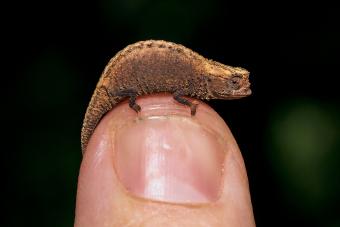
Reptiles are great pets, but some can grow to be enormous, making them difficult to handle or keep. If you're looking for a small reptile pet that will stay petite through adulthood, you might be interested in the green anole, Greek tortoise, pygmy chameleon, mud turtle, crested gecko, or Western hognose. These six small reptiles each have unique needs and characteristics, but they're all tiny in stature.
6 Best Small Reptiles to Keep as Pets
- Green anole
- Crested gecko
- Greek tortoise
- Mud turtle
- Western hognose snake
- Pygmy chameleon
1. Green Anole

The green anole is a small lizard that typically doesn't reach more than 7 inches long when fully grown. Anoles are known as excellent beginner reptiles because they're relatively low-maintenance. Unlike some small reptile lizards that require large terrariums, an anole can thrive in a 10-gallon tank, so it won't take up too much room in your home. Still, this little pet does need a high-quality enclosure with UVA and UVB lights, heated basking spots, and a nutritious diet. Green anoles aren't the cuddliest lizards, as they don't really like being handled.
2. Crested Gecko

Crested geckos are popular pets because of their friendly nature and small size. When fully grown, they reach between 5 and 8 inches in length. Even though they're small, crested geckos need to be housed in a moderate-sized tank. An enclosure for one gecko should be at least 20 gallons with adequate vertical space for climbing. Most crested geckos tolerate gentle handling and are incredibly amusing to watch.
3. Greek Tortoise

Many tortoise species can grow to be several feet long, but the Greek tortoise is one of the few that stays small all their lives. Greek tortoises reach a maximum of 5 to 8 inches long. Despite their small size, these pets can live well into their 50s, so getting one is a lifelong commitment. The Greek tortoise is known to be friendly and calm. They do need quite a bit of space: most owners have enclosures that are at least 3 feet by 6 feet.
In captivity, Greek tortoises have been known to reach 100 years old! Not all Greek tortoises will live this long, but have a care plan in place if something happens and you can no longer look after your tortoise.
4. Mud Turtle

One of the smallest turtle species that you can keep as a pet is the mud turtle, which reaches only 3 to 4 inches in size. Even though a mud turtle can fit in your hand, you probably won't spend much time holding this pet. These turtles aren't terribly friendly and may bite. Turtles are semi-aquatic, which means you'll need to provide them with an environment that includes areas of land as well as water. Turtles are known to be relatively messy pets, but they're certainly entertaining.
5. Western Hognose Snake

If you're looking for a small snake to keep as a pet, the Western hognose might be a good choice. At full maturity, they reach around 2 feet long, though some can grow to 3 feet. These snakes are generally timid and docile, so they make great pets. They can be less challenging to keep than other snake species that might refuse to eat, like the ball python.
Hognose snakes tolerate handling well, but don't overdo it. Typically, you need to handle them one to two times a week, but don't handle your snake more than once a day to keep their stress levels low.
6. Pygmy Chameleon

Do you love chameleons but wish they were smaller? The pygmy chameleon has all the same great qualities as their larger cousins but in a pint-sized body. These small reptile pets are only 3 to 4 inches long when full grown! Pygmy chameleons are fairly docile and friendly, though they don't like being handled too often. Because these pets aren't very hardy, they should only be kept by experienced reptile owners.
Small Reptile Pets With Big Personality
It's important to remember that just because an animal is small, it doesn't mean they can be kept in a small enclosure. Make sure you get a habitat that's the appropriate size for your tiny friend to ensure all their needs are met. For example, some small reptiles, like the anole and gecko, enjoy climbing, whereas tortoises need space to burrow. Do your research and make sure you're ready to share your life with one of these cute reptiles before you bring them home.







